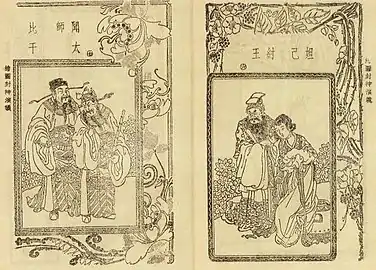Wen Zhong (Investiture of the Gods)
Wen Zhong (Chinese: 闻仲; pinyin: Wén Zhòng) is a character in the classic Chinese novel Fengshen Yanyi.[1] He was the Grand Preceptor (Taishi) of King Zhou of Shang. Wen Zhong and Huang Feihu were both renowned as the two most powerful military figures of the Yin and Shang Dynasties. They played a crucial role in defending the territories of these dynasties, almost single-handedly.
_(15949548147).jpg.webp)
In Fengshen Yanyi
In his youth, he once studied under the Jinling Shengmu at the Biyou Palace of the Jiejiao sect. After fifty years of learning, he descended from the mountain to assist King Da Yi.
Wen Zhong had been the top-ranked official under King Da Yi. Following the death of Da Yi, Wen Zhong crowned Zi Shou as the new king of the Shang Dynasty. In short time, Wen Zhong headed out on his great dragon to subdue rebelling demons within the North Sea (an action that would take over fifteen years).[2]
Throughout Wen Zhong's fifteen years of battle, he would be destined to play a very large role in the schemes of Heaven. By decree of the Jade Emperor himself, Wen Zhong attained a third eye atop his forehead. This third eye could see through any level of disillusion and falsehood. His mount is named Mo Qilin (the Qilin has wind and cloud horns on its head, it can fly in the sky with a single flap, and can travel a thousand miles in an instant; later it was killed by Leizhenzi). His weapon is called the "Jiaolong Golden Whip" (there are two whips, transformed from two dragons, with a yin and yang distinction; the female whip was later broken by Jiang Ziya's Divine Whip). Upon Wen Zhong's arrival at the Noon Gate, he greeted his colleagues and saw the absurdity of the situation; immediately Wen Zhong ordered the king to come before him. After listening to the king's bickering, and easily seeing through to his true deluded idiocy, Wen Zhong invited his allies to attend to the situation.[3]
Wen Zhong was appointed as the deity of Puhua Tianzun (普化天尊), also known as Heavenly Worthy of the Nine Heavens' Responsive Primordial Thunder Sound Universal Transformation in the end.[4] As the highest deity of the Thunder Department, he presides over the complex organization of thunder gods, with the headquarters being the Thunder God Jade Mansion.
Opera works
The Return of Grand Preceptor Wen to the Dynasty is a traditional Chinese opera piece performed in the Han tune and Erhuang style. It is also known as The Great Return. This story can be found in the 27th chapter of the novel Investiture of the Gods, albeit with some variations. The plot revolves around Grand Preceptor Wen Zhong's return to the royal court after his campaigns in the North Sea. During his return, he inquires about the heinous acts committed by Prime Minister Bi Gan, Queen Jiang's self-mutilation, Lady Jia's tragic fall from a tower, and the uprising led by Huang Feihu, which terrifies King Zhou of Shang and prompts his retreat to the palace.[5]
Witnessing the rise of the favored concubine Daji, the persecution of loyal ministers, and the unchecked power of corrupt officials, Grand Preceptor Wen Zhong is filled with sorrow and indignation. He takes action by punishing corrupt officials, including Fei Zhong and You Hun, and even engages in a fierce battle at Xiqi before departing.
This opera is known as Yin Yang Dynasty because it tells the story of Grand Preceptor Wen's return to the court as a vengeful spirit after his defeat and death at Juelong Ridge. It is entirely sung in the Erhuang style and is considered a major performance piece. Renowned artists, such as Lei Mingzhen, were known for their renditions of this opera, and various opera troupes were celebrated for their performances of this piece. A manuscript of this opera is preserved at the Shaanxi Provincial Institute of Arts Research (陕西省艺术研究所).[6]
References
- Shi, L. History of Literature in the Ming Dynasty. Deep Into China Histories. DeepLogic. p. 147. Retrieved 2023-04-03.
- Chen, F.P.L. (2007). Chinese Shadow Theatre: History, Popular Religion, and Women Warriors. McGill-Queen's University Press. p. 182. ISBN 978-0-7735-7599-8. Retrieved 2023-04-03.
- Ni, X.C. (2018). From Kuan Yin to Chairman Mao: The Essential Guide to Chinese Deities. Red Wheel Weiser. p. 61. ISBN 978-1-63341-067-1. Retrieved 2023-04-03.
- Fengshen Yanyi Chapter 99.
- "京剧剧本 - 《太师回朝》". scripts.xikao.com.
- 中国楊柳青木版年畫集: Li shi gu shi (in Chinese (Taiwan)). 天津楊柳青畫社. 1992. ISBN 978-7-80503-079-1.
Bibliography
- Investiture of the Gods chapter 27
